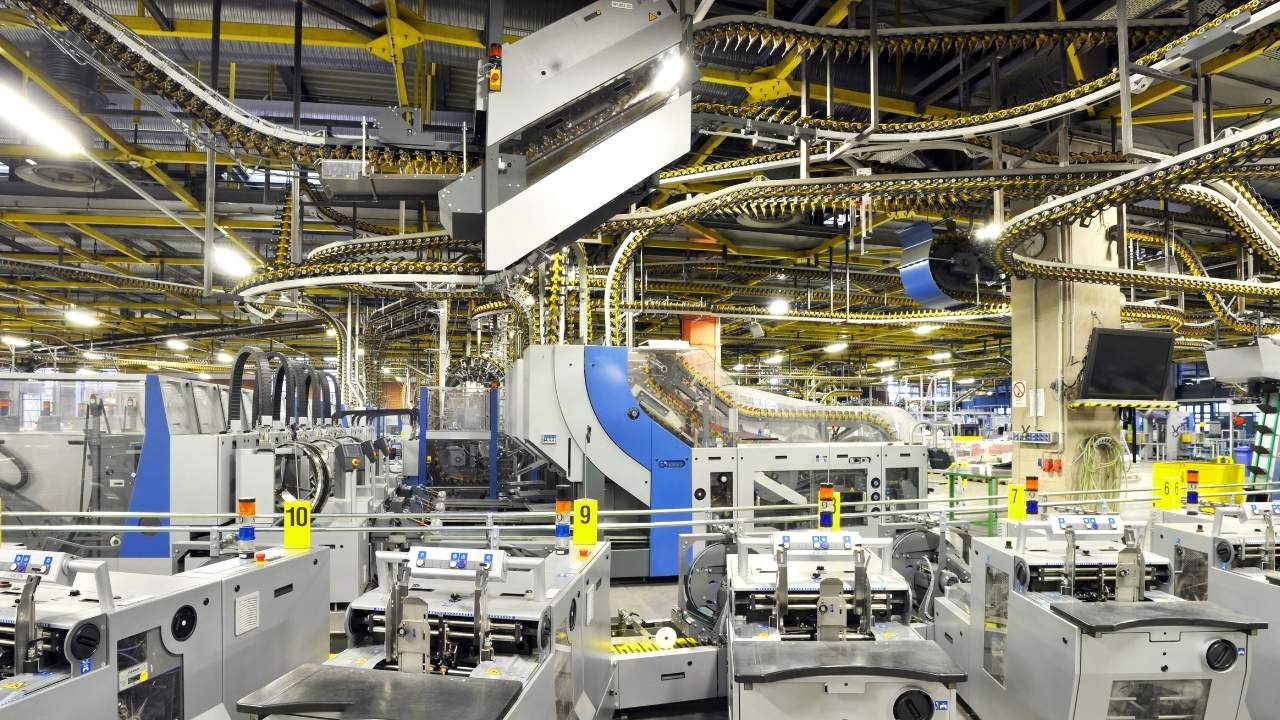Effective production planning and control are essential for any manufacturing business aiming to stay competitive. Versa Cloud ERP is engineered to optimize production planning and control, offering robust tools for scheduling, monitoring, and managing production activities.
What is Manufacturing ERP
For manufacturers, enhancing operational efficiency is a perpetual endeavor. Optimizing production output while keeping up with supply chain coordination and shop floor scheduling poses an endless challenge. However, a proven software solution exists to streamline all aspects of manufacturing – Enterprise Resource Planning (ERP).
Enterprise resource planning (ERP) systems provide that very solution. Purpose-built for the manufacturing sector, ERPs integrate data and automate processes enterprise-wide – from demand forecasting to inventory management. This consolidated view of the value chain provides unmatched visibility, enables predictive planning, and seamlessly aligns disparate operations.
In this article, we explore the transformative capabilities of manufacturing ERPs. Learn how implementing ERP can provide complete production planning control so you can focus on business growth with streamlined operations. The future of efficient manufacturing starts here.
Overcoming Production Planning and Control Challenges with ERP
Manufacturing production environments contend with several challenges ranging from demand variability and supply uncertainties to coordination difficulties and shrinking margins. Fluctuating customer requirements coupled with long production lead times make demand forecasting and production planning exceedingly complex.
Sudden spikes in orders or schedule changes lead to overburdening certain work centers while starving others. Similarly, supply delays of raw materials or purchased components result in production line stoppages or work-in-process pile-ups. Let’s discuss how an integrated ERP system helps conquer these challenges:
Inaccurate Demand Forecasting
With 360-degree data on inquiries, pipelines, past orders, and market dynamics, ERP improves forecast accuracy for aligning output to demand. Its analytics models also help determine optimal inventory levels.
Production Scheduling Complexities
ERP assists production planners by generating realistic build schedules that maximize resource utilization while considering material availability constraints and delivery timelines.
Lack of Inventory Visibility
With every stock movement and accounting update reflected in real-time, ERP enables absolute visibility into raw material, WIP, and finished goods inventory levels across facilities so you can optimize turns.
Supply Chain Disruptions
ERP facilitates supply chain agility and continuity by identifying alternate materials/vendors, adapting orders, and even triggering production plan changes automatically based on purchase order amendments.
Quality Issues
With capabilities ranging from QMS to shop floor data tracking, ERP boosts quality, prevents defects, and ensures complete product genealogy for rapid issue diagnosis.
Coordination Hurdles Across Functions
ERP breaks silos enterprise-wide, seamlessly connecting finance to production, procurement to inventory, sales forecasts to build plans, enabling holistic decision-making.
Planning Inefficiencies Without Real-Time Data
ERP contextualizes data across planning tasks, providing real-time visibility into operational metrics for responsive and informed planning that drives efficiency.
ERP takes charge of monitoring, coordinating, optimizing, and adapting plans and processes so you can focus on accelerating production and perfecting output!
Components of the Production Planning and Control Processes Improved by ERP
So what exactly can manufacturing ERP software do when it comes to supercharging planning for production processes? In essence, ERP enhances and connects activities across departments – from assessing market demand to scheduling shop floor operations. Let’s break down some of the key gears that keep your manufacturing engine humming!
Inventory Control and Workflow Coordination
ERP optimizes safety stock minimums, synchronizes just-in-time replenishment with consumption, and keeps processes flowing smoothly using Lean methodologies. This reduces waste while coordinating workflows across the facility for streamlined production.
Master Production Scheduling (MPS)
Using sales forecasts as a guide, ERP helps create master production schedules that sequence manufacturing operations and map out delivery timelines. As products progress from work centers to finished goods, ERP adjusts priorities and capacity allocations in real-time while considering constraints like lead times and available labor.
Material Requirements Planning (MRP)
ERP determines the right amount of parts and raw materials needed for production orders using bills of materials, purchase order data, and inventory levels. This ensures you have components on hand for schedule requirements without tying up excess working capital.
Resource Planning and Capacity Management
By modeling throughput volumes and bottlenecks, manufacturing ERP enables planning shop floor labor, equipment utilization, and outsourced operations to avoid capacity shortfalls. Adjustments can be made dynamically based on order trends, preventive maintenance needs, and volume fluctuation.
Demand Forecasting and Sales Forecasting
Guesstimating product demand is no way to run an efficient operation! ERP solutions leverage statistical analysis, predictive modeling, and assessment of market trends to generate accurate sales forecasts. This ensures you have reliable visibility into future order volumes so you can optimize downstream production planning.
Core Benefits of Leveraging ERP for Production Optimization
Now that you know what ERP does, let’s talk about the benefits! Implementing ERP software results in:
Complete real-time visibility through unified data and integrated processes – Consolidating information across business units into a centralized database breaks down data silos. Standardizing workflows ensures activities are accurately captured as they occur for transparency into operations.
Robust inventory and supplier management capabilities – ERP enhances traceability of inventory stock levels in near real-time while synchronizing with supply chains via vendor collaboration portals. This reduces shortages and keeps output on track.
Automation and integration of workflows across departments – Manual hand-offs between departments have become a thing of the past. ERP automatically keeps relevant teams on the same page while managing interdependent flows.
Data-driven decision-making with analytics and reporting – Embedded analytics convert raw data into actionable business insights. Key reporting allows performance monitoring based on KPIs while predictive modeling sustains continuous improvement.
Accurate demand forecasting and optimized production scheduling – Purpose-built algorithms generate reliable demand forecasts. These guide scheduling engines that assign finite capacity for work centers and sequence jobs cost-effectively.
ERP Enables Real-Time Data Analytics and Visualization
Increasing reliance on data analytics is a growing trend across industries, and manufacturing ERP provides embedded reporting and dashboards that transform data into actionable insights, including:
- Real-time inventory monitoring
- Production status dashboards
- Supply chain analytics
- Planning exception alerts
- Interactive self-service reports
- Profitability variance analysis
By making critical information readily accessible, ERP empowers stakeholders to identify improvement opportunities, address issues proactively, and guide strategic decisions.
ERP Breaks Down Information Silos Through System Integration
Historically, production data tends to get fragmented across disconnected systems between departments. ERP breaks down these information silos by:
Integrating business processes across departments – Financial, inventory, supply chain, and shop floor data are managed through integrated workflows rather than separate databases.
Providing unified data access using a central database – With all applications accessing a common dataset, information remains consistent. This single source of truth enables transparency across teams.
Enabling real-time departmental collaboration – Cross-functional communication barriers are eliminated. All stakeholders can coordinate workflows dynamically with complete visibility.
Reducing redundant data entry and manual errors – Data is entered once at the source. Information flows to relevant departments automatically through workflows rather than manual rework.
Automating and streamlining interdependent workflows – System prompts to guide users, ensuring adherence to standardized processes. Built-in validations minimize deviations while accelerating execution.
Benefits by Department
While ERP unifies operations across departments, let’s discuss how it uniquely impacts some key teams:
Manufacturing: Detailed cost analysis ensures efficient production schedules meet profitability goals. Quality protocols embed compliance while maximizing yield.
Procurement: Collaboration portals facilitate electronic communication of material requirements with suppliers. This reduces delays while enforcing SLAs.
Finance: With transactions tied to workflows, the general ledger remains perpetually up-to-date. Cash flows and working capital are optimized.
Key Capabilities of Manufacturing ERP Systems
To truly enhance planning and process control, ERP solutions offer built-in tools for:
-
Material Requirements Planning (MRP)
MRP smooths material procurement, inventory management, and production activity coordination based on demand forecasts and orders in hand.
-
Manufacturing Execution System (MES)
MES supports data collection and analysis regarding equipment effectiveness, product genealogy, and quality testing for driving shop floor performance.
-
Quality Management System (QMS)
QMS automates quality management workflows spanning inspection planning, defect tracking, and corrective action. This minimizes quality issues and product recalls via standardized protocols.
-
Advanced Planning and Scheduling
Sophisticated planning and scheduling algorithms help optimize production timelines across multiple products, outputs, and shared resources considering material/capacity constraints.
-
Warehouse Management System
Warehouse management capabilities facilitate raw material kitting, inventory replenishment, and systematic picking and packing to feed production lines just in time.
-
Shop Floor Integration and Line Control
Lastly, shop floor integration provides detailed visibility and KPI monitoring while enabling rapid issue resolution by adapting machine parameters or notifying maintenance crews promptly.
ERP equips manufacturers with integrated data, infrastructure, and intelligence for driving productivity through planning enhancements and tighter control across end-to-end operations.
Streamline Production Planning and Control with Versa Cloud ERP
As evident, implementing a robust manufacturing ERP solution like Versa Cloud ERP drives tangible improvements across production environments. By connecting critical processes from inventory control to shop floor scheduling and adding real-time planning capabilities, Versa ERP enables you to overcome supply volatility while responding to shifts in customer demand with agility.
Specifically, Versa Cloud ERP supercharges your manufacturing ecosystem with the following:







Whether you seek to implement just-in-time practices, reduce bottlenecks, or manage rapid growth, Versa ERP provides the manufacturing operations platform to accelerate production planning.
Want to experience these benefits first-hand? Schedule a free personalized Versa Cloud ERP demo now! Our experts are ready to showcase how Versa can optimize workflows, analytics, and planning for your unique manufacturing environment. Get started by booking your free demo today.
Empower your business with the knowledge to navigate the realm of an Integrated ERP solution, specifically tailored to your business needs. Gain insights, streamline processes, and propel your financial management to new heights with this comprehensive guide
With Versa Cloud ERP’s Implementation guide learn how a business can ensure a successful ERP Solution Implementation. Navigate the complexities of implementation with confidence!
Effectively manage your financials, accounting, inventory, production, and warehouse management workflows with our award-winning ERP.
Let Versa Cloud Erp’s do the heavy lifting for you.
[widget id=”custom_html-40″]
[widget id=”custom_html-42″]
[widget id=”custom_html-30″]
Do Business on the Move!
Make your businesses hassle-free and cut the heavyweights sign up for the Versa Cloud ERP today!!
Join our Versa Community and be Future-ready with us.
[widget id=”custom_html-20″]






